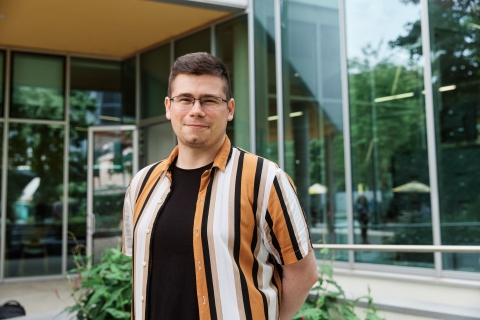
In celebration of Pride Month 2024, we had the pleasure of speaking with Kris Nolan, a final-year PhD student in the School of Area Studies, Sociology, History, Politics, and Literature.
Kris is currently researching LGBTQ+ activism for his thesis, shedding light on this important social movement.
LGBTQ+ activism research by PhD student Kris Nolan
So, hi Kris, thank you for talking to us today for Pride Month. Please tell us a little bit about your research into LGBT activism. So, I'm going to be talking today about section 28, which was an amendment to the Local Government Act, 1988. And section 28 essentially removes any mention or communication around homosexuality in education, and essentially stated that a local authority could not promote homosexuality. It could not publish materials with the intent of promoting homosexuality, and it could not talk about any type of family other than a traditional heterosexual family. And in terms of the reactions to this legislation, it essentially damage the lives of generations of young LGBT folks. Seeing the representation of non-traditional families while you're growing up so powerful when it comes to young kids who may be questioning their sexuality, who might be thinking, I'm different, but I don't know why, and having that representation in their schools would have helped massively with them realising their self-identity. And section 28 essentially removes that from education. In terms of resistance to this, from the higher education sector, students were staunchly against section 28. It wasn't repealed until 2000. In Scotland and 2003, in England and Wales. It didn't apply in Northern Ireland. So essentially we see 15 years where this legislation is essentially removing the opportunity to talk about homosexuality in schools. Students, as I said, was staunchly against the legislation. And we saw numbers rising up to 50,000 in opposition to the act. In 1988, we saw local protests in Leeds, Manchester, Newcastle, London, just to name a few. And essentially the the thematic thread surrounds this activism was one of unity. It was one of solidarity. And we see placards in newspapers with all sorts of different messages. And my favourite one and I talk about this often is the placard that says we're gay, we're proud and we're angry. And I think that really highlights the sentimentality around these students. It really signifies this will to be seen, will to be heard. And indeed, the overriding arguments of my LGBT section is that students wanted to be seen, they wanted to be heard, and the only way they felt they could do this was through their activism. And we see local and national movements erupt across the country in 1988. And even though this activism didn't result in the repeal of the section, it very much forced the government to see this traditionally marginalised community rising up to say, we don't want this, we don't think this is a good move. And when it comes to the reactions to this legislation, the students were being taught about political mobilisation, they're being taught about political systems, so being taught about events, organising. And so even though this activism didn't result in it being pulled back, it taught a generation of gay students that they don't need to simply roll over. They they can rise up. They can speak their voice. As traditionally the LGBT community, even today, are still being marginalised and are still being villainized and without the activism of these students. I argue in my paper that we wouldn't have the 2004 Civil Partnerships Act, which allowed gay people to enter into civil partnerships. Nor would we have the 2013 Same Sex Couples Act, which allowed gay people to get married. It allowed me to get engaged myself. So without the actions of these activists raising the voices of young gay people, I wouldn't be here today to be able to talk about those histories. And indeed, the arguments around activism is that through this oppressive legislation, it enabled young people to be empowered. I think that's a really powerful message to say pride is political. There's no denying that. And pride was about raising your voice. Pride is about being empowered to speak what it is you want to say, to make people understand that we are still a marginalised community. And this section 28 is just another part of that history. And I'm very proud to be able to contribute to that history. You know, without activists that were fighting in 1988, I wouldn't be able to do my research here in 2024. So despite it being incredibly oppressive legislation, it empowered a generation of young people to stand up and fight against such oppressive legislation. Thank you so much, Kris, for taking your time to speak to us today for pride 2024 and we really look forward to reading more about your research. Thank you very much.
Enable University alerts
Turn on notifications for critical updates like closures, safety alerts, and urgent service disruptions.






